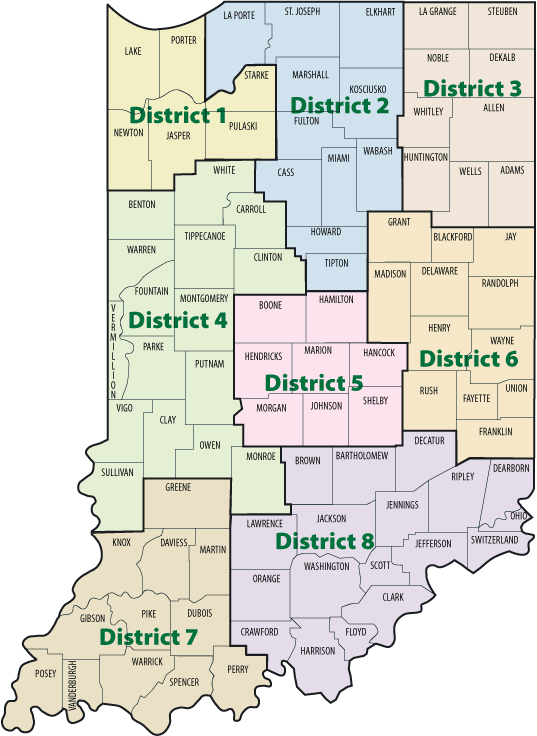Section 4: Rights and Regulations
153 Bureau of Developmental Disabilities Districts and Offices
BDDS District Offices Contact Information
Vocational Rehabilitation (VR), within the Bureau of Rehabilitation Services, and Division of Developmental Disabilities and Rehabilitative Services (DDRS), Family and Social Services Administration (FSSA), works to assist individuals with disabilities with the assessments, services and supports (e.g., assistive technology) needed to plan, achieve and sustain their employment goals. Staying abreast of policies that guide VR services can assist in either initially accessing or navigating available services with additional guidance and support by your VR counselor.
Order of Selection
On August 1, 2017, Indiana became the 35th state to implement an order of selection following approval from the Rehabilitation Services Administration. This request and subsequent approval were due to an insufficiency of resources to serve all eligible individuals. Order of selection is used to prioritize consumer services for individuals who meet criteria for the most significant disabilities with no waiting period in receipt of services. All individuals who are eligible for VR are evaluated and assigned to Disability Service Priority Categories based on criteria set forth in Indiana Administrative Code (IAC).
It is estimated that more than 80% of individuals eligible for VR services are determined to have a most significant disability (460 IAC 14-8-1(b)) and thus receive services without delay. Individuals who fall within Priority Categories 2 and 3 (i.e., individuals with significant disabilities, all other eligible individuals) are placed within a “delayed services” status and experience a waiting period prior to receipt of services. Category assignment includes review and evaluation of a range of skills and materials (e.g., educational and medical records) to determine the impact of an individual’s impairment(s) with focus on whether such impairments impact one or more functional capacity areas. Functional capacity areas include but are not limited to receptive or expressive communication, ability to understand oral or written instructions, assistive or adaptive technology needs, physical stamina or restrictions, work experience and skills, social interactions, behaviors, ability to perform activities of daily living, decision making and problem-solving skills, and navigation and transportation use among home and work settings. Information is provided to VR eligible individuals with respect to this process as well as their options should they disagree with or have questions related to this process and determination.
VR eligible individuals who fall within the two service priority categories that are “closed” or classified as being within a “delayed services” status will receive a letter every 6 months from VR to stay in contact and ensure information remains up to date. In addition, information and referral to other local workforce options are provided to assist with further progression in achieving or making progress on vocational goals. Options may include but not be limited to Work One Centers, Ticket to Employment Networks, Independent Living Centers, IN Data Assistive Technology program and other college, career and disability service offices. Annual review and assessment of capacity and resource needs will further guide the capacity of VR to serve eligible individuals in closed priority categories.
Further information about order of selection can be accessed at https://www.in.gov/fssa/ddrs/5285.htm.
Pre-Employment Transition Services (Pre-ETS)
Under the Workforce Innovation and Opportunity Act (WIOA; GovTrack.us, 2020), an amendment to the Rehabilitation Act of 1973, Pre-Employment Transition Services (Pre-ETS) were established with specific allocation of federal funds to support their delivery. Pre-ETS provides opportunity for VR eligible and potentially VR eligible students between 14-22 years of age, who are enrolled in an educational program, to engage in meaningful career planning in support of their transition from high school to employment or other post-secondary training options. Pre-ETS services, often delivered in individual and/or group formats, deliver core services across 5 areas: job exploration counseling, work-based learning experiences, counseling on postsecondary opportunities, workplace readiness training, and instruction in self-advocacy.
With consideration of the above noted order of selection for Indiana and other applicable states, VR counselors and VR youth counselors work to ensure that students who are eligible for Pre-ETS are connected with and/or receiving services through Pre-ETS before determining his or her Disability Service Priority Category. This additional step in ensuring individuals who may be able to receive additional Pre-ETS services works to support individuals in working towards, achieving and sustaining vocational outcomes.
Further information related to Pre-ETS is accessible at https://www.in.gov/fssa/ddrs/5474.htm.

